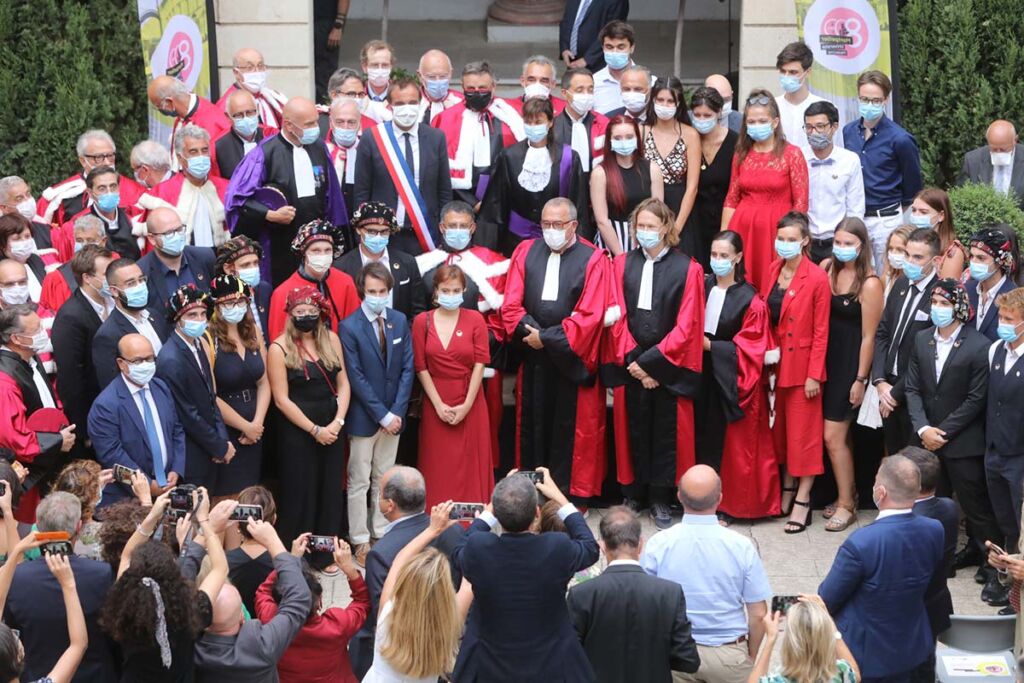August 17, 1220, in Montpellier: and medicine was born!
On August 17, the University of Montpellier celebrated the 800th anniversary of its Faculty of Medicine. Eight centuries of history and progress have made it the oldest university medical school in the world. The anniversary was disrupted by the health crisis, but UM's academic, institutional, and socioeconomic partners, as well as faculty and student representatives, were still able to participate.

It was in the heat of a late summer afternoon, tempered by the coolness of its old stones, that the Faculty of Medicine celebrated its eight centuries of existence on August 17. Was it so pleasant in Montpellier on August 17, 1220? History does not tell us, but it does tell us that it was on this very day that Cardinal Conrad of Urach, legate of Pope Honorius III, promulgated the Statutes ofthe Universitas medicorum Montispessulani, thusbringing Montpellier into the history of medicine.
A story with a capital "H" which, in this year 2020, has had to come to terms with the contingencies of our particular current situation. Due to the health crisis, only 200 people were able to attend the commemoration ceremony held in the Atrium of the history faculty. For just over an hour, academics and local elected officials spoke, drawing a connection between the institution's centuries-old tradition and a future now embodied by the new Arnaud de Villeneuve campus and its ultra-modern facilities.
A unique university
Sophie Béjean, Rector of the Occitanie academic region and Chancellor of Universities, had the honor of unveiling the commemorative plaque, on which students and visitors can read: "OnAugust17,1220,Cardinal Conrad ofUbach,legate of Pope Honorius III in Languedoc, enactedthe statutes of the Universitas medicorum, tam doctorum quam discipulorum, Montispessulani, the oldest medical university in the world."
A motto which, according to Gérald Chanques, spokesperson for the Association des 800 ans de la Faculté de médecine (Association for the 800th Anniversary of the Faculty of Medicine), "serves as a reminder that, since its foundation and the granting of its first statutes, the University of Montpellier has remained unique. " Indeed, born out of the meeting of Christian and Jewish doctors under the strong influence of Arabic medicine, it remained a purely medical university until the Revolution. It opened up very early on to dissection and the natural sciences, developing a global vision of man in his environment, which would remain its hallmark even after the Revolution, during which the Convention retained only three health schools—Paris, Strasbourg, and Montpellier—after the abolition of universities.
Universal medicine...
"It is no coincidence that the oldest botanical garden is located in Montpellier,"points out Michel Mondain, Dean of the University of Montpellier-Nîmes. Montpellier was also the site of France's first"probably unofficial"dissection, performed by Henri de Mondeville, and, more importantly,"the first city where an edict stipulated that the city had to provide one corpse per year taken from the gallows, then two corpses per year for teaching purposes," the dean adds. A pedagogical innovation...even back then!
It is this openness that has contributed so much to bringing the discipline into the pantheon of sciences, as Thierry Lavabre Bertrand, Vice President of the University and President of the 800th anniversary organizing committee, pointed out: "What we are celebrating is not simply the anniversary of a Faculty of Medicine. We are celebrating the day when, for the first time,medicine was considered ascience, a field of knowledge, on a par with philosophy, law, and other disciplines, with universal significance."
Deeply rooted in its territory
Universality and humanism, two pillars of this faculty, which Rabelais, a student in Montpellier in his day, summed up in his famous phrase: "Science without conscience is but the ruin of the soul." Over the centuries, this strong identity has become that of an entire city, as Philippe Augé, President of the UM, was keen to point out, emphasizing the essential place that the University now occupies at the heart of its territory. "Montpellier would not have developed as much without its university, and the university has been able to flourish fully in this city. A university owes its reputation not only to its international rankings, but also to its regional presence."
A statement that will resonate with the 3,000 new medical students who, following in the footsteps of illustrious predecessors such as Nostradamus, Lapeyronie, and Rondelet, have once again chosen Montpellier and medicine in 2020 to shape their future. A future marked by innovation and excellence, where modernity never overshadows heritage.